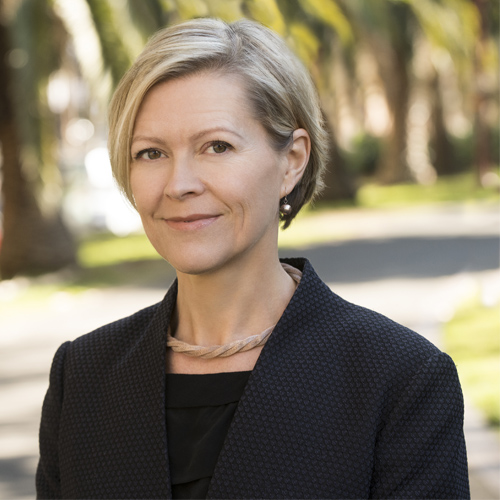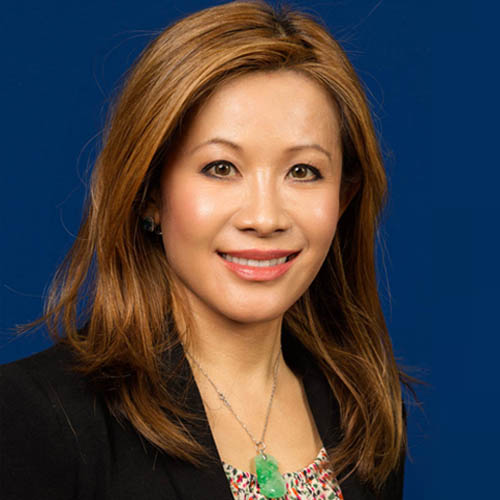
Kate Howitt, Fidelity
As a mother of two teenagers, Kate Howitt finds it strange that young people are expected to know their future career. After finishing high school in Oklahoma, Howitt started a liberal arts degree in New Mexico. She never considered an investment career.
Today, Howitt is one of the world’s top female fund managers. In 2021, Howitt ranked in Citywire’s top 30 female fund managers report – for the fourth consecutive year. She was the only Australian-based fund manager to achieve that ranking.
As portfolio manager of the Fidelity Australian Opportunities Fund, Howitt invests $2 billion in up to 70 ASX-listed companies.
“Growing up, I was completely oblivious to a career in funds management,” says Howitt. “Like many young people, I wasn’t sure what I wanted to do, so I did the broadest possible degree imaginable. I didn’t start my investment career until my thirties.”
Howitt’s journey has insights for other women who are considering a career in financial markets – or who want to get started in share investing for themselves
Her views are timely: women comprised 45% of people who began investing in ASX-listed investments, according to the ASX Australian Investor Study 2020. The study said: “the next few years are set to see a growing number of women and younger people actively investing”. Women accounted for 51% of intending investors, the study found.
Understanding how companies work
Howitt’s passion for investing developed from her interest in company performance. About halfway through her arts degree, Howitt thought she needed a qualification that would lead to a higher-paying job (she worked as a waitress during her degree and wanted to forge a career).
Business beckoned. Howitt was accepted into the University of Chicago, which is known for its business school. After growing up in Parramatta (she moved to the US with her parents at age 13), Howitt learned from some of the world’s great business thinkers.
“During my MBA, I became really interested in what makes a great company and how that changes over time,” she says. “I’ve never lost that curiosity. My job is ultimately about finding the best companies and assessing their value relative to the share price.”
Howitt’s business career began in the 1990s at Boston Consulting Group. Having endured too many freezing US winters, she returned to Australia and a career at AMP, first in investor relations, then in its capital-market division. Howitt understood the inner workings of companies, but investment markets were foreign to her.
“At the start of my time in investor relations, I remember asking people to explain this thing about a ‘buy side and sell side’ in equity markets,” quips Howitt. “I had to learn the basics about investing and the Australian sharemarket. Once I did, I realised I wanted to be the person asking questions about companies, not answering them.”
In 2007, Howitt joined Fidelity International as a portfolio manager. Fidelity was expanding in Australia and had long championed women in funds management. “For me, it was a long and at times tortuous career path into fund management. But I believe having a few different careers before my investment career was really beneficial.”
Howitt says an investment career suits people who are curious about how the world works and have quantitative and qualitative skills. “There’s a misconception that fund managers stare at spreadsheets and balance sheets all day long. The numbers are important, and you have to embrace the quantitative side of the role. But you must also be good at asking questions, talking to people and putting things together.”
Howitt believes STEM (Science, Technology, Engineering and Mathematics) subjects at school and university provide a good grounding for an investment career. She says aspiring young investors should read The Economist each week and allocate a few hours on the weekend for their own company analysis.
“Pick a company you are familiar with through your purchase habits. You can download lots of information about that company using the wonderful resources of the ASX website. Decide if the company is high quality and worth buying now for the price. Then, track your hypothetical investment over time to see how it performs. You’ll realise how challenging, frustrating and fascinating the market is. If you do go on to an investment career, you’ll take a lot of practical learning with you to your employer.”
Howitt hopes more women will consider a career in fund management. “Women make up 12% of the fund-management industry globally. There’s no logic for such a low figure. If more women were involved in investing people’s retirement savings, we’d get better long-term outcomes due to the benefits of diverse thinking.”
From the lab to healthcare stocks
Bianca Ogden is another leading fund manager in Australia. Since 2007, Dr Ogden has managed the Platinum International Health Care Fund. In that role, Ogden and her team invest $571 million in multinational pharmaceutical companies, biotechs, medical-device makers and other healthcare companies.
After growing up in Germany, Ogden worked at Novartis in Switzerland, then did a PhD at University College London. She studied Kaposi’s sarcoma, a type of cancer that affects people with immune deficiencies, such as HIV or AIDs. In the movie Philadelphia, the Tom Hanks character had purple lesions of Kaposi’s sarcoma on his face.
After her PhD, Ogden worked as a laboratory scientist at Johnson & Johnson in Australia. A chance meeting at a conference led to a job interview with Platinum Asset Management co-founder, Kerr Neilson, in 2003. Platinum was considering launching a specialist healthcare managed fund.

Bianca Ogden, Platinum
“I really struggled in the first six months of my new job,” says Ogden. “I had no idea what a Price Earnings (PE) ratio meant. When my colleagues talked about Fannie Mae and Freddie Mac (the giant US federally-backed mortgage companies) I thought they were talking about real people. I was a scientist who knew nothing about investing.”
She didn’t realise it at the time, but Ogden’s science training provided the foundations for a career at Platinum that is approaching its 20th year. “I’d listen to my colleagues say they think this company’s earnings will grow 5-10% next year. As a scientist, I wanted to base decisions about companies purely on the facts and be precise.”
When analysing pharmaceutical and biotech companies, Ogden dives deep into their science. “I’m trying to find biotech and pharmaceutical companies that are developing technologies that could be very valuable in the future.”
She adds: “A science background gives you a great starting point but there is so much more in terms of commercial strategy, understanding timelines and always making sure you understand the global competitive environment. No degree teaches you all that. It is you how you put the puzzle pieces together. Scientists like to do that detective work.”
Ogden’s interest in emerging science led her to Moderna Inc, a US pharmaceutical and biotech company, in 2016. “At the time, there was a lot of negative sentiment towards Moderna and its mRNA technology. Platinum believed in the potential of Moderna’s science and invested in the company. Moderna developed one of the COVID-19 vaccines and is pioneering mRNA technology.”
Ogden hopes more young women who study STEM subjects at school or university will pursue a career in funds management. “Someone who has their heart set on a career in science might not even realise those skills could take them a long way in an investment career. The STEM subjects provide a good analytical basis for investing.”
A science background also helps Ogden learn from investment failures. “As a scientist, you take so much from experiments that don’t work out as expected. It's the same in investing. People usually pay most attention to their stock winners, but there is so much you can learn from the failures. You need to analysis and understand what went wrong with an investment. That’s how you become a better investor over time.”
Curiosity is another trait of successful investors, says Ogden. As an only child, she had to experience many things for herself. “If you like being continually exposed to new things – and are willing to learn – an investment career is very rewarding. You need that curiosity and belief in the unknown to invest in biotech.”

Elizabeth Tian, Citi
Creativity and mathematics
Elizabeth Tian began her investment career in the mid-90s at CommSec. After finishing a commerce degree at university, Tian saw an ad for a client-service role at the online broker. Her ability to speak Cantonese helped get the job.
After a few years, Tian moved to Macquarie Group, where she worked as a private-client adviser. Future roles at Colonial Geared Investments and Royal Bank of Scotland developed Tian’s interest in equity derivatives.
In 2014, Tian joined Citi and is currently Director of Equity Derivatives Solutions, Global Markets. Tian, a regular presenter at ASX Investor Day, is known for her work at Citi Warrants. You can learn more about ASX warrants here.
“Derivatives are considered one of the more mathematical parts of finance, however it need not be overly complex,” says Tian. “To me, derivatives are also one of the most creative areas of investing. I think of derivatives as building blocks that I can put together to create solutions for investors.”
Tian has seen greater interest from investors and brokers in using warrants on companies that have benefited as people stayed at home during the pandemic (supermarkets, retailers, homeware stocks) versus companies that look to benefit as the global economy opens (airlines, tourism, oil stocks).
Tian says within equity derivatives there are typically three roles: sales, trading and product structuring. Each requires different skillsets. “I’m in sales and work with traders and structurers. I can go from presenting to a large audience, to sales trading warrants, to helping structure derivatives in unique ways for clients. I love the breadth of the role.”
Tian was born in Malaysia and did primary school in Melbourne. She returned to Malaysia for high school and then to Australia for university. She’s been here ever since.
An investment career, says Tian, offers a better work/life balance than it did in the 1990s. “Citi is incredibly supportive of work/life balance and women who work here. If you are interested in a career in finance, getting into a graduate program at a big investment bank is a good idea. You get to see different aspects of markets and decide what you like.”
More Investor Update articles
The views, opinions or recommendations of the author in this article are solely those of the author and do not in any way reflect the views, opinions, recommendations, of ASX Limited ABN 98 008 624 691 and its related bodies corporate (“ASX”). ASX makes no representation or warranty with respect to the accuracy, completeness or currency of the content. The content is for educational purposes only and does not constitute financial advice. Independent advice should be obtained from an Australian financial services licensee before making investment decisions. To the extent permitted by law, ASX excludes all liability for any loss or damage arising in any way including by way of negligence.
